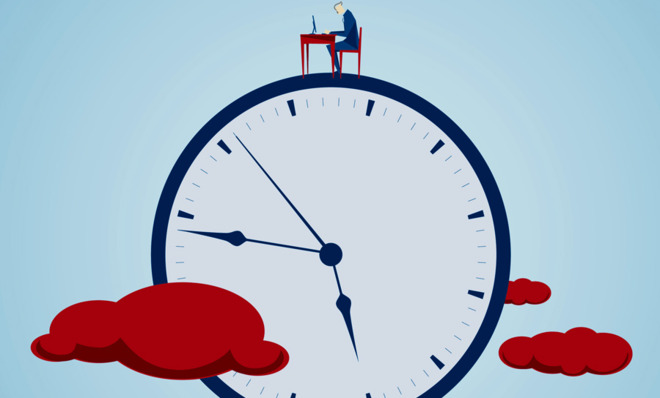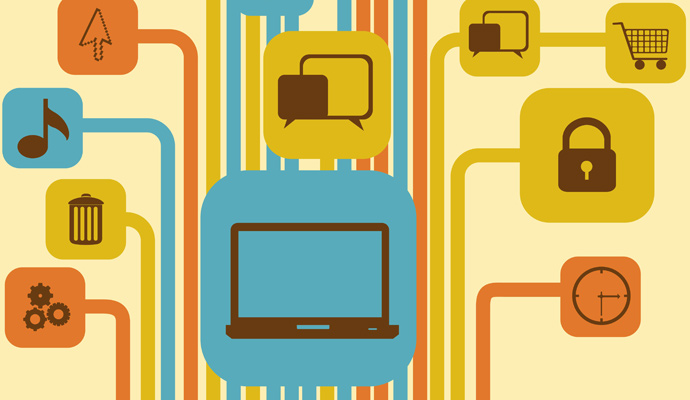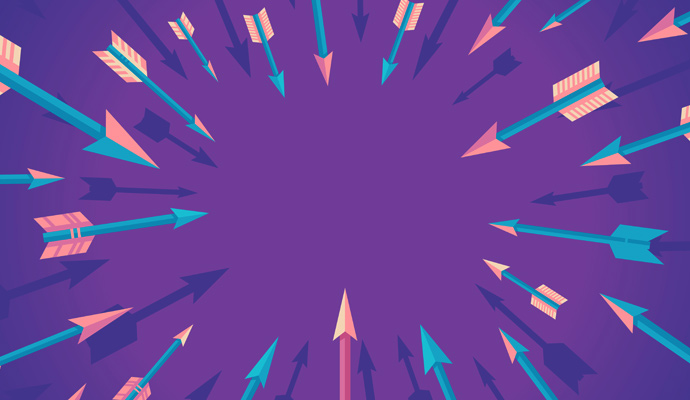6 things the most productive people do every day
Most productivity systems act like we're robots — they forget the enormous power of feelings

A free daily email with the biggest news stories of the day – and the best features from TheWeek.com
You are now subscribed
Your newsletter sign-up was successful

Ever feel like you're just not getting enough done?
Know how many days per week you're actually productive?
The Week
Escape your echo chamber. Get the facts behind the news, plus analysis from multiple perspectives.

Sign up for The Week's Free Newsletters
From our morning news briefing to a weekly Good News Newsletter, get the best of The Week delivered directly to your inbox.
From our morning news briefing to a weekly Good News Newsletter, get the best of The Week delivered directly to your inbox.
People work an average of 45 hours a week; they consider about 17 of those hours to be unproductive (U.S.: 45 hours a week; 16 hours are considered unproductive). [Microsoft]
We could all be accomplishing a lot more — but then again, none of us wants to be a workaholic either.
It'd be great to get tons done and have work/life balance. But how do we do that? I decided to get some answers.
And who better to ask than Tim Ferriss, author of the international bestseller, The 4-Hour Workweek?
(Tim's blog is here and his podcast is here.)
A free daily email with the biggest news stories of the day – and the best features from TheWeek.com
Below are six tips Tim offered, the science behind why they work, and insight from the most productive people around.
1) Manage your mood
Most productivity systems act like we're robots – they forget the enormous power of feelings.
If you start the day calm it's easy to get the right things done and focus.
But when we wake up and the fray is already upon us — phone ringing, emails coming in, fire alarms going off — you spend the whole day reacting.
This means you're not in the driver's seat working on your priorities, you're responding to what gets thrown at you, important or not.
Here's Tim:
I try to have the first 80 to 90 minutes of my day vary as little as possible. I think that a routine is necessary to feel in control and non-reactive, which reduces anxiety. It therefore also makes you more productive.
Research shows how you start the day has an enormous effect on productivity and you procrastinate more when you're in a bad mood.
Studies demonstrate happiness increases productivity and makes you more successful.
As Shawn Achor describes in his book The Happiness Advantage:
…doctors put in a positive mood before making a diagnosis show almost three times more intelligence and creativity than doctors in a neutral state, and they make accurate diagnoses 19 percent faster. Optimistic salespeople outsell their pessimistic counterparts by 56 percent. Students primed to feel happy before taking math achievement tests far outperform their neutral peers. It turns out that our brains are literally hardwired to perform at their best not when they are negative or even neutral, but when they are positive. [The Happiness Advantage]
So think a little less about managing the work and a little more about managing your moods.
(For more on how to be happier, go here.)
So what's the first step to managing your mood after you wake up?
2) Don't check email in the morning

To some people this is utter heresy. Many can't imagine not waking up and immediately checking email or social media feeds.
I've interviewed a number of very productive people and nobody said, "Spend more time with email."
Why is checking email in the morning a cardinal sin? You're setting yourself up to react.
An email comes in and suddenly you're giving your best hours to someone else's goals, not yours.
You're not planning your day and prioritizing, you're letting your objectives be hijacked by whoever randomly decides to enter your inbox.
Here's Tim:
…whenever possible, do not check email for the first hour or two of the day. It's difficult for some people to imagine. "How can I do that? I need to check email to get the information I need to work on my most important one or two to-dos?"
You would be surprised how often that is not the case. You might need to get into your email to finish 100 percent of your most important to-dos. But can you get 80 or 90 percent done before you go into Gmail and have your rat brain explode with freak-out, dopamine excitement, and cortisol panic? Yes.
Research shows email:
1. Stresses you out.2. Can turn you into a jerk.3. Can be more addictive than alcohol and tobacco.4. And checking email frequently is the equivalent of dropping your IQ 10 points.
Is this really how you want to start your day?
(For more on how to avoid the email trap and spend time wisely go here.)
Great, so you know what not to do. But a bigger question looms: what should you be doing?
3) Before you try to do it faster, ask whether it should be done at all
Everyone asks, "Why is it so impossible to get everything done?" But the answer is stunningly easy: You're doing too many things.
Want to be more productive? Don't ask how to make something more efficient until after you've asked "Do I need to do this at all?"
Here's Tim:
Doing something well does not make it important. I think this is one of the most common problems with a lot of time-management or productivity advice; they focus on how to do things quickly. The vast majority of things that people do quickly should not be done at all.
It's funny that we complain we have so little time and then we prioritize like time is endless. Instead, do what is important… and not much else.
But is this true in the real world?
Research shows CEOs don't get more done by blindly working more hours, they get more done when they follow careful plans:
Preliminary analysis from CEOs in India found that a firm's sales increased as the CEO worked more hours. But more intriguingly, the correlation between CEO time use and output was driven entirely by hours spent in planned activities. Planning doesn't have to mean that the hours are spent in meetings, though meetings with employees were correlated with higher sales; it's just that CEO time is a limited and valuable resource, and planning how it should be allocated increases the chances that it's spent in productive ways. [What the Most Successful People Do at Work: A Short Guide to Making Over Your Career]
(For more ways to save time go here.)
Okay, you've cleared the decks. Your head is serene, you've gotten the email monkey off your back, and you know what you need to do.
Now we have to face one of the biggest problems of the modern era: how do you sit still and focus?
4) Focus is nothing more than eliminating distractions

Ed Hallowell, former professor at Harvard Medical School and bestselling author of Driven to Distraction, says we have "culturally generated ADD."
Has modern life permanently damaged our attention spans?
No. What you do have is more tantalizing, easily accessible, shiny things available to you 24/7 than any human being has ever had.
The answer is to lock yourself somewhere to make all the flashing, buzzing distractions go away.
Here's Tim:
Focus is a function, first and foremost, of limiting the number of options you give yourself for procrastinating… I think that focus is thought of as this magical ability. It's not a magical ability. It's put yourself in a padded room, with the problem that you need to work on, and shut the door. That's it. The degree to which you can replicate that, and systematize it, is the extent to which you will have focus.
What's the best way to sum up the research? How about this: Distractions make you stupid.
And a flood of studies show that the easiest and most powerful way to change your behavior is to change your environment.
Top CEOs are interrupted every 20 minutes. How do they get anything done?
By working from home in the morning for 90 minutes where no one can bother them:
They found that not one of the 12 executives was ever able to work uninterruptedly more than 20 minutes at a time — at least not in the office. Only at home was there some chance of concentration. And the only one of the 12 who did not make important, long-range decisions "off the cuff," and sandwiched in between unimportant but long telephone calls and "crisis" problems, was the executive who worked at home every morning for an hour and a half before coming to the office. [The Practice of Management]
(For more on how to stop procrastinating go here.)
I know what some of you are thinking: I have other responsibilities. Meetings. My boss needs me. My spouse calls. I can't just hide.
This is why you need a system.
5) Have a personal system
I've spoken to a lot of insanely productive people. You know what none of them said? "I don't know how I get stuff done. I just wing it and hope for the best."
Not one. Your routines can be formal and scientific or personal and idiosyncratic — but either way, productive people have a routine.
Here's Tim:
Defining routines and systems is more effective than relying on self-discipline. I think self-discipline is overrated.
Allowing yourself the option to do what you have not decided to do is disempowering and asking for failure. I encourage people to develop routines so that their decision-making is only applied to the most creative aspects of their work, or wherever their unique talent happens to lie.
Great systems work because they make things automatic, and don't tax your very limited supply of willpower.
What do we see when we systematically study the great geniuses of all time? Almost all had personal routines that worked for them.
(Give and Take author Adam Grant consistently writes in the mornings while Tim always writes at night.)
How do you start to develop your own personal system? Apply some "80/20″ thinking:
1. What handful of activities are responsible for the disproportionate number of your successes?2. What handful of activities absolutely crater your productivity?3. Rearrange your schedule to do more of #1 and to eliminate #2 as much as possible.
(For more on the routines geniuses use to be productive click here.)
So you're all set to wake up tomorrow with a system and not be "reactive." How do you make sure you follow through on this tomorrow? It's simple.
6) Define your goals the night before
Wake up knowing what is important before the day's pseudo-emergencies come barging into your life and your inbox screams new commands.
Here's Tim:
Define your one or two most important to-dos before dinner, the day before.
Bestselling author Dan Pink gives similar advice:
Establish a closing ritual. Know when to stop working. Try to end each work day the same way, too. Straighten up your desk. Back up your computer. Make a list of what you need to do tomorrow. [Free Agent Nation: The Future of Working for Yourself]
Research says you're more likely to follow through if you're specific and if you write your goals down.
Studies show this has a secondary benefit: writing down what you need to do tomorrow relieves anxiety and helps you enjoy your evening.
(For more information on setting and achieving goals click here.)
So how does this all come together?
Sum up
Here are Tim's 6 tips:
1. Manage your mood2. Don't check email in the morning3. Before you try to do it faster, ask whether it should be done at all4. Focus is nothing more than eliminating distractions5. Have a personal system6. Define your goals the night before
The word "productivity" sounds like we're talking about machines. But the irony is that much of being truly good with time is about feelings.
How should you strive to feel when working? Busy, but not rushed. Research shows this is when people are happiest.
I couldn't have written this without the help of Tim Ferriss and Adam Grant. Both volunteered their very valuable time.
Was that a waste on their part? They definitely won't get those minutes back. Helping others takes time but research shows it makes us feel like we have more time. And it makes us happier. Once you are more productive, you'll have a lot more hours to fill. So why not use them to make others and yourself happier?
(I'll be sending out more tips from Tim Ferriss in my weekly email so make sure to sign up.)
Join 85K+ readers. Get a free weekly update via email here.
More from Barking Up The Wrong Tree...